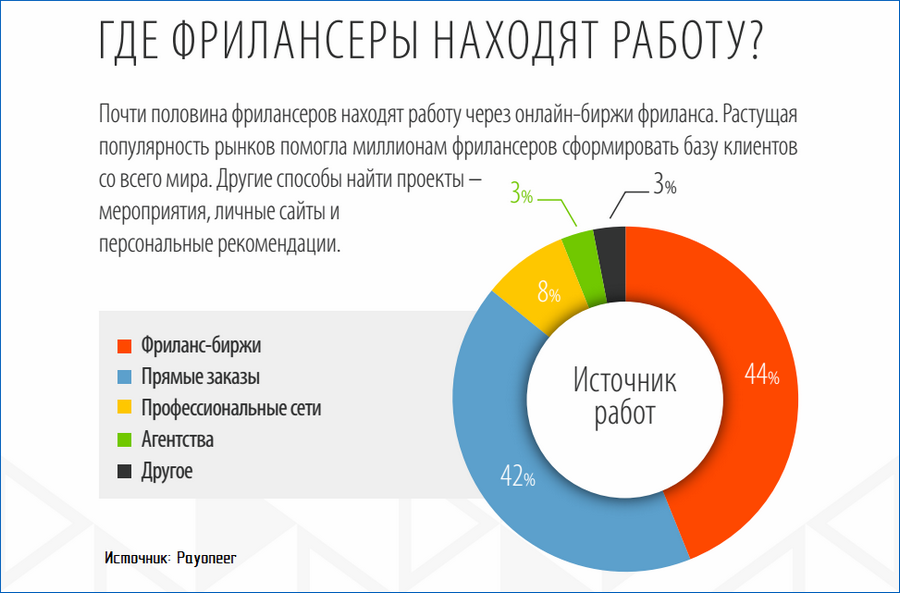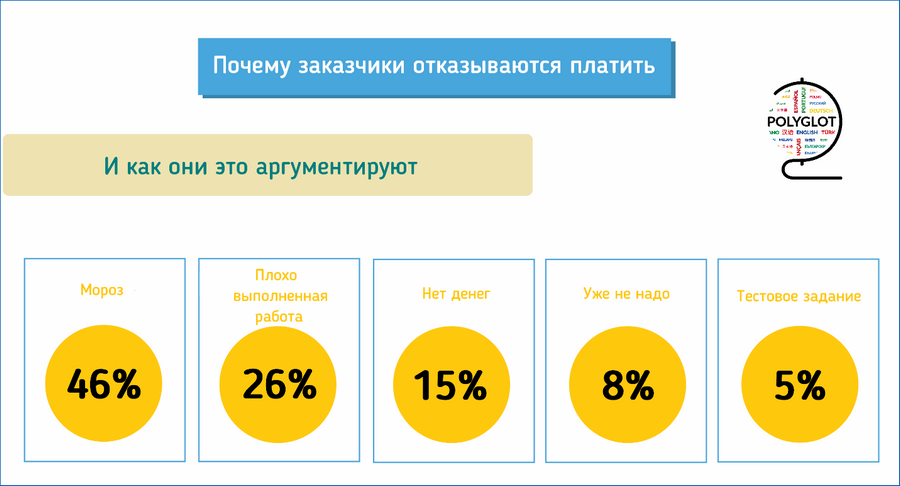10 ways to protect customers from fraud
There are different customers: someone throws money at them, and someone waves them at the nose, takes work and melts away like yellow snow in the spring. And you, young freelancer, look for the wind in the field. Anyone who left the galley or did not reach it at all is dedicated to ...

Earlier we wrote about what the freelancer should do if the customer refuses to pay , and received many valuable feedback. Therefore, we summarized the recommendations and conducted our research on how freelancers protect themselves from non-payment for work done by customers. Immediately, from the very beginning of the disclosure of this topic, we thank all those who answered our questions, shared their experience and thereby helped in the preparation of this article. A survey of freelancers from different countries, in which more than 300 participants took part, showed that in the CIS countries, independent experts are almost 2 times more likely to experience delays in payment or even refuse to pay for the work done than to freelancers from the United States.
')

From the customers side, it would seem, everything is clear. No self-respecting person will pay for bullshit: an overdue deadline, software with numerous bugs, translation via Google translate or an article written by a fifteen-year-old schoolboy with a fluff under his nose. All this as well as possible influences the reputation of an independent specialist, so thrived by professional freelancers. But we are not talking about that now. Honor and glory of customers cherished by Thai virgins, who regularly list blood to the accounts of freelancers who immaculately fulfill orders and value their careers as their own fifth point in a dark alley, we will not stain. Even when they are justified, they refuse to pay an outcast from the world of freelancing, trying to cash in on these noble and revered people, this does not affect their fame. But, unfortunately, in the couple of boyars happens mob, which prefers miserable aferki rather than honest calculation. And how do they justify their intentions in the case when the freelancer has done his job perfectly - we'll talk about that now.

As it turned out, however, it is not surprising, almost half of the scammers use the method “I am not me and the mare is not mine”. Simply put, just ignore the artist after receiving the finished work. They prudently in the profile on the freelance exchange do not indicate their real name and do not put links to social. network. Apparently, after receiving the work done, the Internet is deleted from them. The second argument in the ranking was “No, I don’t like it, somehow vyalenko”. TK is fully observed, but who cares? Here we are talking about when the customer can not even specify exactly what he does not like in the work. It’s another thing when the task was indeed clumsily completed, but then the comments were specific.

The third place was taken by the argument “Sorry, but the money ran out. There is nothing to pay. ” Well, okay then, you can not pay. The next was the cancellation of the project after receiving the finished work. 8% of freelancers who are faced with unscrupulous customers report that the order has already been canceled and all agreements with the contractor have been canceled. And finally, the most original, but the least popular “Money? What kind of money? This is a test task. So what, what is the volume ”.

Phased payment will protect the contractor from a significant loss of time and effort to work for the “thank you”. It is necessary to agree in advance on the scope of work for which a phased payment will be made after the execution and clearly duplicated after discussion, keeping the screen as a souvenir.
On the one hand, this is a normal business practice, but on the other hand, far from all customers will agree to give an advance to a freelancer with whom they have not previously worked. Stories are known cases when unscrupulous performers took an advance payment and disappeared. Customers are also afraid of losing their money, as performers - their time, which for them is money. Freelance professionals advise to take a prepayment from 30% to 50%, but this concerns more well-known specialists who have a pool of regular customers and have a good reputation. For beginners - more than 30% in advance is not worth asking.
That being said, combo. Few customers agree to this, but the combination of these two methods will allow you to save a lot of nerves and strength. An interesting option is also a phased prepayment (just a pun of some kind).

The contract and act of acceptance of work - the main legal methods that will protect against non-payment. About drafting an agreement in your favor can be read here .

If you work through a freelance platform on which the “Secure Transaction” service is provided, this will allow you to do without prepayment requests, contracts and other difficulties. There are also third-party Safe Deal services with a commission, which will be useful in the case when you work with the customer directly, for example, SafeCrow or WayForPay.
No, no, of course, it’s not about quitting freelancing and hiring remotely, but about your customer being not some kind of person you are not sure about the authenticity of what name, but the company. That is, you will communicate with an employee of this company, but in most cases he will not discredit the reputation of his employer. Too much information you can find about the company or even add something for everyone to see.
There is already the second combo - when you have a good friend working in the company-customer that you know. And orders can be regular, and payment is guaranteed almost always. Few would dare to throw theirs, though ...
The point here is not at all in racism, but in the fact that it is in these countries that unscrupulous customers most often meet. Although the same freelancers there even more. If you do not have to choose, then you need ...
The difficulty is that customers usually do not worry about their online reputation, so even on exchanges their profiles are often not completely filled. Name, nicknames, contacts, reviews - all this needs to be “swept through” and on other resources, suddenly you will stumble upon something. Try to discuss the conditions with the customer voice - with some probability it will help to identify the fraudster with the help of intuition. Here all means are good.
If there is such an opportunity, of course. If there is a customer from your city, do not be lazy to meet with him in person to discuss the details of the transaction in case the order is worthwhile. And if the order for an impressive amount, then you can drive to the next town for a meeting. Personal meeting will not give guarantees, but will significantly increase the chances of getting paid for the work done.
Combining several of the above methods will be more effective than using only one. Each specific situation requires a separate selection of methods, and some are universal, for example, the first three. And how do you insure against fraud?

Earlier we wrote about what the freelancer should do if the customer refuses to pay , and received many valuable feedback. Therefore, we summarized the recommendations and conducted our research on how freelancers protect themselves from non-payment for work done by customers. Immediately, from the very beginning of the disclosure of this topic, we thank all those who answered our questions, shared their experience and thereby helped in the preparation of this article. A survey of freelancers from different countries, in which more than 300 participants took part, showed that in the CIS countries, independent experts are almost 2 times more likely to experience delays in payment or even refuse to pay for the work done than to freelancers from the United States.
Why customers refuse to pay
')

From the customers side, it would seem, everything is clear. No self-respecting person will pay for bullshit: an overdue deadline, software with numerous bugs, translation via Google translate or an article written by a fifteen-year-old schoolboy with a fluff under his nose. All this as well as possible influences the reputation of an independent specialist, so thrived by professional freelancers. But we are not talking about that now. Honor and glory of customers cherished by Thai virgins, who regularly list blood to the accounts of freelancers who immaculately fulfill orders and value their careers as their own fifth point in a dark alley, we will not stain. Even when they are justified, they refuse to pay an outcast from the world of freelancing, trying to cash in on these noble and revered people, this does not affect their fame. But, unfortunately, in the couple of boyars happens mob, which prefers miserable aferki rather than honest calculation. And how do they justify their intentions in the case when the freelancer has done his job perfectly - we'll talk about that now.

As it turned out, however, it is not surprising, almost half of the scammers use the method “I am not me and the mare is not mine”. Simply put, just ignore the artist after receiving the finished work. They prudently in the profile on the freelance exchange do not indicate their real name and do not put links to social. network. Apparently, after receiving the work done, the Internet is deleted from them. The second argument in the ranking was “No, I don’t like it, somehow vyalenko”. TK is fully observed, but who cares? Here we are talking about when the customer can not even specify exactly what he does not like in the work. It’s another thing when the task was indeed clumsily completed, but then the comments were specific.

The third place was taken by the argument “Sorry, but the money ran out. There is nothing to pay. ” Well, okay then, you can not pay. The next was the cancellation of the project after receiving the finished work. 8% of freelancers who are faced with unscrupulous customers report that the order has already been canceled and all agreements with the contractor have been canceled. And finally, the most original, but the least popular “Money? What kind of money? This is a test task. So what, what is the volume ”.
Ways to protect customers from fraud

1. Work in Milestown
Phased payment will protect the contractor from a significant loss of time and effort to work for the “thank you”. It is necessary to agree in advance on the scope of work for which a phased payment will be made after the execution and clearly duplicated after discussion, keeping the screen as a souvenir.
2. Take a prepayment
On the one hand, this is a normal business practice, but on the other hand, far from all customers will agree to give an advance to a freelancer with whom they have not previously worked. Stories are known cases when unscrupulous performers took an advance payment and disappeared. Customers are also afraid of losing their money, as performers - their time, which for them is money. Freelance professionals advise to take a prepayment from 30% to 50%, but this concerns more well-known specialists who have a pool of regular customers and have a good reputation. For beginners - more than 30% in advance is not worth asking.
3. Link staged and prepaid
That being said, combo. Few customers agree to this, but the combination of these two methods will allow you to save a lot of nerves and strength. An interesting option is also a phased prepayment (just a pun of some kind).

4. Conclude an agreement + item “UTZ”
The contract and act of acceptance of work - the main legal methods that will protect against non-payment. About drafting an agreement in your favor can be read here .

5. Secure transaction
If you work through a freelance platform on which the “Secure Transaction” service is provided, this will allow you to do without prepayment requests, contracts and other difficulties. There are also third-party Safe Deal services with a commission, which will be useful in the case when you work with the customer directly, for example, SafeCrow or WayForPay.
6. Work for a company
No, no, of course, it’s not about quitting freelancing and hiring remotely, but about your customer being not some kind of person you are not sure about the authenticity of what name, but the company. That is, you will communicate with an employee of this company, but in most cases he will not discredit the reputation of his employer. Too much information you can find about the company or even add something for everyone to see.
7. Work through the guarantor
There is already the second combo - when you have a good friend working in the company-customer that you know. And orders can be regular, and payment is guaranteed almost always. Few would dare to throw theirs, though ...
8. Avoid customers from India and Pakistan.
The point here is not at all in racism, but in the fact that it is in these countries that unscrupulous customers most often meet. Although the same freelancers there even more. If you do not have to choose, then you need ...
9. Carefully study customer information
The difficulty is that customers usually do not worry about their online reputation, so even on exchanges their profiles are often not completely filled. Name, nicknames, contacts, reviews - all this needs to be “swept through” and on other resources, suddenly you will stumble upon something. Try to discuss the conditions with the customer voice - with some probability it will help to identify the fraudster with the help of intuition. Here all means are good.
10. Know the customer in person
If there is such an opportunity, of course. If there is a customer from your city, do not be lazy to meet with him in person to discuss the details of the transaction in case the order is worthwhile. And if the order for an impressive amount, then you can drive to the next town for a meeting. Personal meeting will not give guarantees, but will significantly increase the chances of getting paid for the work done.
Combining several of the above methods will be more effective than using only one. Each specific situation requires a separate selection of methods, and some are universal, for example, the first three. And how do you insure against fraud?
Source: https://habr.com/ru/post/302886/
All Articles